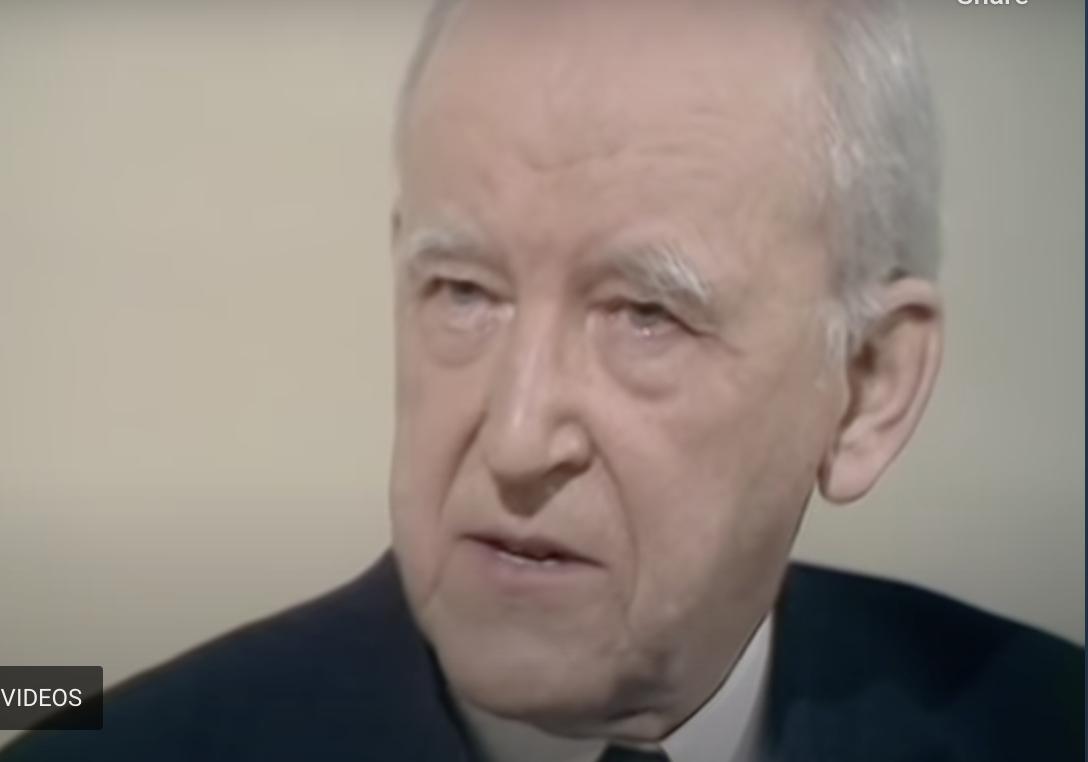Influential UK preacher the late Martyn Lloyd-Jones was interviewed by broadcaster Aneirin Talfan Davies and the subject of politics came up.
Davies: Two traits in the evangelical outlook on religion, it seems to me that they tend to lessen the social content of the gospels. That is, there is a lack of social content, and it seems to me a refusal to face the modern world with all its problems. And the other one is a kind of exclusivity, spiritual exclusivity, which inhibits them from joining with their fellow Christians in action. Now, that’s a long question. I’ll give you time to reply to it without disturbing you.
MLJ: Yes. Well, the trouble is you won’t give me time. You see, I should need many hours on both the questions with which I’m very familiar. Of course, this is the usual taunt.
Now, with regard to your first question, I just dispute that completely. There is all the difference in the world between exercising a political and social influence directly and indirectly. I believe the function of the church is to do this indirectly. In other words, it is not the business of the preacher to deal with political and social issues in the pulpit. He is to preach to men and women laypeople who are to go out into the world to do this and never have they had a greater need of the spiritual note. The danger is to be materialistic in outlook.
Now, and I think this has been true historically. I think I could show very easily that it is the evangelical gospel – it in its preaching has had the greatest impact upon this country politically and socially. For instance, hospitals started in this way. Education – The main impetus to that was the evangelical awakening of 200 years ago.
It’s agreed that the trades union movement came out of this, but you see this is indirect. In other words, when you build up a man spiritually and make a true Christian of him, then he develops a social conscience.
Whereas these other men were always preaching politics and about social conditions. I observed that the main effect they have is to drive their congregations away. Their congregations have become smaller and smaller, and some of them have even have to amalgamate with other churches comparatively recently – I’ve observed with much interest. In other words, they have no impact at all. The main result of a man preaching politics to me is that he gets notoriety, but he doesn’t affect the situation at all.
Now, I think this is a very vital point. For instance, you remember there was a time when there was such a thing as the non-conformist conscience and people had to pay attention to it. Hugh Price Hughes, a Methodist preacher, gave an address on a Sunday afternoon here in London, and [The Prime minister] Mr. Gladstone had to listen to him and take a particular attitude with regard to [Irish nationalist MP] Parnell. Why? Not because Hugh Price Hughes was a preacher or a political preacher, but that Mr. Gladstone knew that the non-conformist conscience, which in turn leads to the non-conformist vote, would be against him if he didn’t listen.
So … if I want to influence political social conditions, my best plan of doing so is to produce Christian people in large numbers and then the politicians will pay attention. They don’t listen to what the preachers say about political and social issues.
Davies: Well, I said I wouldn’t butt in, but just to remind ourselves that your first ministry after you left the medical profession was in Port Talbot in a working class neighborhood.
MLJ: Precisely.
Davies: Why was that decision taken?
MLJ: Well, I wanted to go there because I wanted to be with people, with the working class people in particular. It seems to me this is the great trouble in the church today that she’s not touching the working classes. I was there amongst them and the majority of the members of our church were working class men.
Davies: Would these working class men in your chapel in Port Talbot, but would they also be enthusiastic trade unionists?
MLJ: Of course they were. There were great politicians. Even the secretary of the church when I went there was a great politician, but he came to see that he needed something more. In other words, I saw that the great trouble in Port Bert Talbot, and remember when I went there, the member for that constituency was [Labour Prime Minister} Mr. Ramsey McDonald, and they almost worshiped him. So my great theme in a sense was put not your faith in princes. And when he [defected from Labour and] formed his coalition government, of course, I became a true prophet.
I’d always tell them not to trust men to this extent, and they were very disillusioned and it gave me a great opportunity preaching the gospel.
The full interview is at https://www.mljtrust.org/meet-mlj/


Preacher should preach to Civil leaders. But they should only say what the word of God says and not less than that or more than that. If they only give their own opinion they are just moralising and most people see through that viewing it as worthless. But we are in the trouble we are now in because the ministers of the Churches have not communicated the word of God to the people nor to the Government.
Historically Church leaders have a terrible record in opposing social evils, such as slavery in America, kidnapping: and apartheid. in South Africa. And today murder of children in the womb and sodomy.